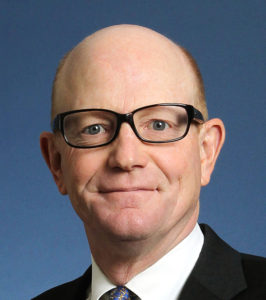A Conversation with Grocery Real Estate Pioneer Phillips Edison
January 16, 2018 | Beth Glavosek | Blue Vault

|
Chief Executive Officer and President Jeff Edison, together with Michael C. Phillips, founded Phillips Edison & Company and has served as a principal of the company since 1995. From 1991 to 1995, he was employed by NationsBank’s South Charles Realty Corporation, serving as a Senior Vice President from 1993 until 1995 and as a Vice President from 1991 until 1993. Mr. Edison was employed by Morgan Stanley Realty Incorporated from 1987 until 1990 and The Taubman Company from 1984 until 1987. Mr. Edison received his bachelor’s degree in mathematics and economics from Colgate University in 1982 and a master’s degree in business administration from Harvard Business School in 1984. Mr. Edison also serves as Chief Executive Officer and Chairman of the Board of Phillips Edison Grocery Center REIT II, Inc. |
With the internalization of its Grocery Center REIT I’s advisor, Phillips Edison has hit some significant milestones this year.
We caught up recently with Jeff Edison, Chief Executive Officer, and President, who explained where these REITs stand and why he’s still as keen on the grocery sector as he was 25 years ago when the company started.
The early years
Phillips Edison began in 1991 as a small venture between several partners to buy a distressed shopping center in Danville, Virginia. “We saw an opportunity to buy this center, infuse capital, and bring it up to ‘core’ standards,” Jeff explains. “On a deal-by-deal basis, we went on to build a portfolio doing the same thing for other properties. By 2001, we were able to offer a private fund of these properties to high-net-worth investors, followed by a second fund in 2002.”
These two early funds were rolled into one entity, which formed the base of Phillips Edison & Company, which recently combined with Phillips Edison’s Grocery Center REIT I. REIT I was launched in 2010 in an effort to reach retail investors. “At the time, we saw a slowing in institutional funds coming in, and we weren’t sure that the timing was right to launch a publicly traded REIT. So, we decided that a nontraded REIT platform was the way to go,” Jeff says.
Recent milestones for Phillips Edison’s REITs
The REIT today is comprised of 236 grocery-anchored properties with 26 million square feet in 32 states. The REIT recently acquired its sponsor and external advisor, a move that is generally considered a critical step on the path to a potential exit strategy. “Over the past 3-1/2 years, we’ve undergone an extensive process to get to where we are today, in terms of being able to internalize our adviser and declare a net asset value of $11 per share. We’ve reached an appropriate scale and tenant diversification, as well as a good balance of leverage and capital, and the future remains open in terms of which exit strategy the REIT may pursue,” Jeff says.
Jeff also notes that Phillips Edison Grocery Center REIT II closed to new investors in 2015. REIT II continues to focus on delivering value for shareholders by increasing net operating income, leasing vacant spaces, renewing tenants and managing property expenses.
Supporting growth in the grocery-anchored sector
Despite the availability of online grocery shopping, bricks and mortar stores are not going away anytime soon. Currently, online grocery shopping only accounts for 1-2% of all grocery sales, and Jeff points to online giant Amazon’s purchase of Whole Foods as evidence that an Internet-only strategy by itself will not work. “Ultimately, the consumer will decide the appropriate balance between shopping online and shopping in physical stores,” he says. “Right now, most of our inline tenants [those adjacent to the anchor store] are considered necessity retail, and we believe that these services will remain highly relevant.” Such services include urgent care clinics, dry cleaners, nail salons, fitness centers, and fast food.
The company also works alongside tenants that want to implement new conveniences like curbside pickup, gas stations, or drive-thru windows. “Whether they need additional parking spaces or room to grow, we take care of the physical requirements,” Jeff says. In addition to attending to the day-to-day management of these centers and tenant relations, Phillips Edison adds value by working to appeal taxes to keep them as low as possible, and securing temporary tenants when empty space can be occupied (think seasonal or holiday-related popups). In fact, Phillips Edison’s temporary tenant program brings in upwards of $4 million in revenue each year.
Putting more emphasis on “community” in its community centers
Jeff envisions grocery-anchored centers continuing to evolve to be supportive of the lifestyles that consumers today are leading. This means attracting tenants that offer convenience and one-stop shopping. Someone who works out at a fitness center located in a retail center can go next door for a smoothie, grab some groceries, and maybe even get her nails done, all in one spot. Likewise, the busy parent can take a sick child to an urgent care clinic and then quickly get the prescriptions filled at the nearby pharmacy while picking up dinner to take home.
Above all, grocery-anchored centers will continue to evolve to meet the ever-changing needs of our busy society. “Time is so valuable to everyone,” Jeff says. “In order to deliver a great experience, I like to say that we are creating community within our community centers.”
The validity of Jeff’s phrase is evident from the launch of Phillips Edison’s national PECO Grow campaign, an initiative designed to emphasize the company’s long-term commitment to the communities it serves, which focuses on strengthening relationships with tenants, local community leaders, and community influencers.
![]()
Learn more about Phillips Edison & Company on the Blue Vault Sponsor Focus page.

Phillips Edison Grocery Center REIT I Changes Name to Phillips Edison & Company, Inc.
Phillips Edison Grocery Center REIT I Increases Estimated Value per Share by 8%, Plans Name Change
Phillips Edison Grocery Center REIT I Arranges $195 Million in 14 Secured Mortgage Loans











